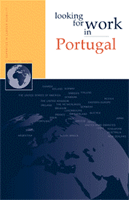Portugal – General Advice
General Advice
In the past, big neighbouring country Spain has often attracted the attention away for Portugal. But now, Portugal is building on its own strengths and characteristics and it is a rather distinct market with tourism as one of its strongly growing sectors.
Job hunting in Portugal
Speculative applications, especially for recent graduates, are an important route to employment. Personal contacts are very helpful in this respect. Especially for small and medium sized companies informal methods of recruitment (word of mouth, networking, speculative applications) are routine.
For that reason a working holiday or a temporary job in for instance the tourist sector might be a good stepping–stone to more permanent work. Your temporary job will allow you to get acquainted with Portuguese people, who could help you in spotting employers who are likely to recruit in the near future. Hiring employers are otherwise rather difficult to trace.
With speculative applications you are advised to telephone in advance, which will allow you to find out to whom to direct application and you are able to introduce yourself and show your interest in the company. It is also possible to advertise yourself in the “situations wanted” of the newspapers, but the entry needs to be eye-catching to be successful.
The Application Letter
Application letters can either be typewritten or hand-written. In case of a speculative application, hand-written letters are most common. A reaction to an advertisement however should be typed, short and simple, with a conventional style.
Try to emphasize in your letter your skills and experience that makes you a suitable candidate for the job. Copies of diplomas and testimonials of former employers are not yet requested at this stage. Do not send them to the employer, but do bring them with you to the job interview.
The use of application forms is widespread in Portugal. There is a large difference between application forms. Some are very standardised, while others ask more about previous practical experience in unstructured (i.e. open) questions.
The Curriculum Vitae
A Portuguese CV is usually in reversed chronological order. Several pages are not uncommon, with a maximum of three to four pages. A clear presentation is requested, numbering each section separately.
Start with your personal details (name, date and place of birth, civil status, address and telephone number including the international access code). In this section you can also mention whether or not you have a driving license, as well as your ID number and your religion.
Continue with your education (including courses), professional training (a distinct category from university education), work experience, linguistic ability (mention in order of fluency the languages you are able to speak) and a separate section for seminars you attended. Computer skills, if applicable should also be given apart.
Emphasise all the professional training you have had from seminars to full courses. For Portuguese recruiters this means that your former employers thought you were outstanding enough to receive further training.
The Application Procedure
Portuguese application habits are less regulated than in some other countries. This openness often helps the mobile worker. The most important of the selection procedure are the interviews. Most emphasis is on professional experience and practical training.
Usually the selection procedure consists of several interviews and some psychological and technical tests. Aptitude and psychometric tests are used for candidates up to middle level management.
It seems as an open door, but be aware employers are looking for graduates who match their needs. So the most important thing you can do when applying for any job is to read the vacancy advert carefully! Not meeting the requirements for the job is in most cases the reason for failing to pass the selection round.
If we got you thinking about Portugal – think about ordering the guide ”Looking for Work in Portugal’’.
About the author
 Nannette Ripmeester is the expatriate affairs consultant to several multinational companies, which she advises regarding the strategy of international assignments and the practical implementation around expat issues.
Nannette Ripmeester is the expatriate affairs consultant to several multinational companies, which she advises regarding the strategy of international assignments and the practical implementation around expat issues.
Ripmeester started her international career at the European Commission, has worked on a project basis in 17 countries and is founder and Managing Director of Expertise in Labour Mobility (www.labourmobility.com).
She is co-author of a series of country-specific guides, the guide “Looking for work in Portugal”, (ISBN-13: 978-90-5896-079-5) is part of that series of guides. To order this guide or other guides that will help you to secure the international job you want, visit our website: www.labourmobility.com. As a reader of Eurograduate we offer you a 10% discount if you are your copy here.